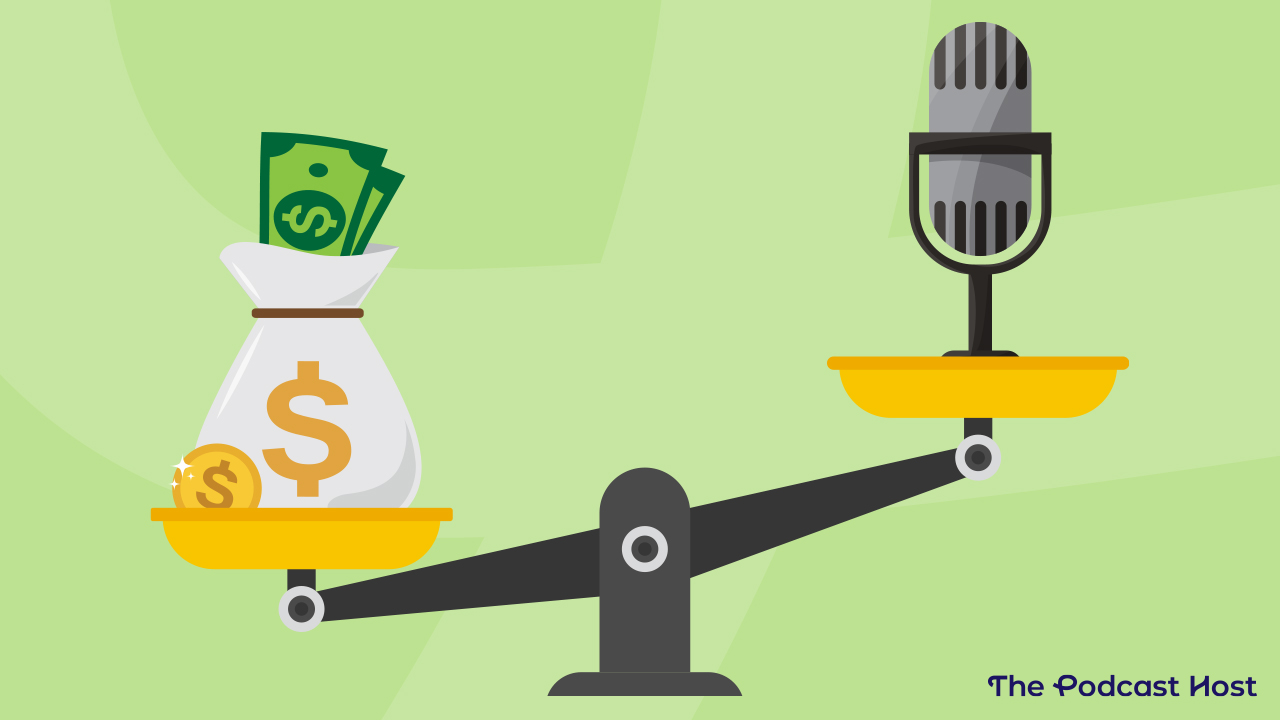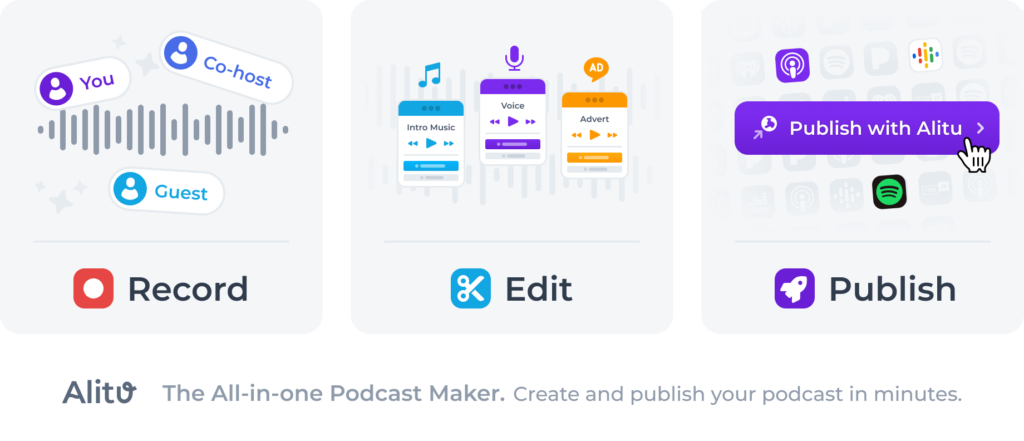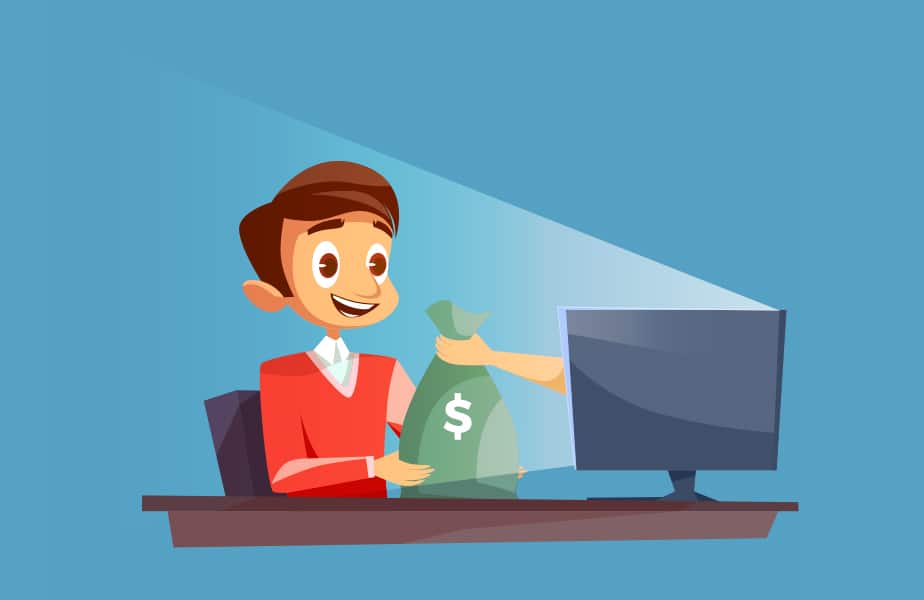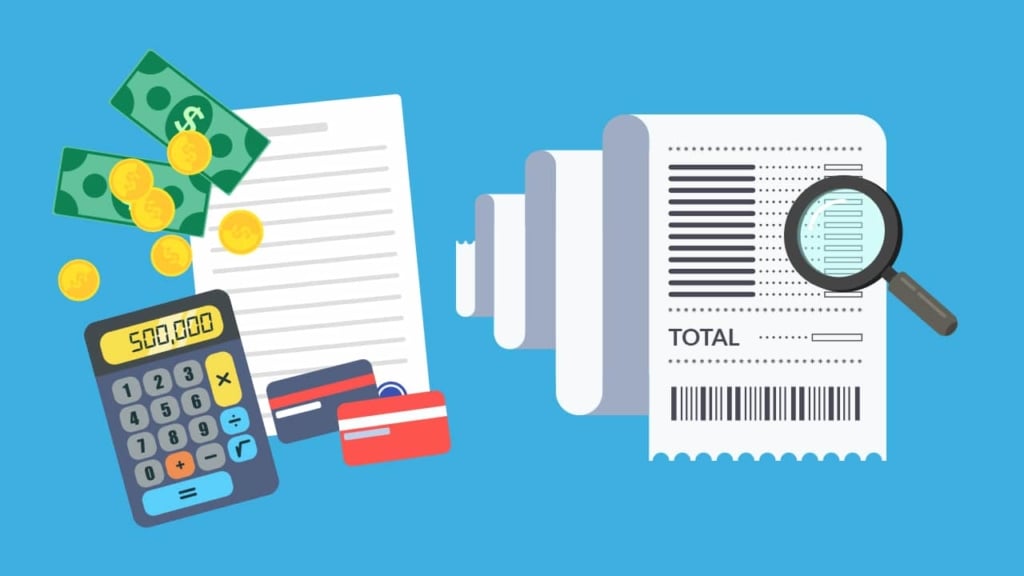How Much Does Podcasting Cost in 2024? A Guide to Podcast Prices

Throughout the hundreds of people I’ve taught about podcasting over the years, I’ve discovered there’s always a concern. No matter how fired up that person is, no matter how fired up YOU are about podcasting, there’s always a doubt or two. Sometimes it’s equipment: “I’m just not a techie!” And sometimes it’s confidence: “I hate my voice…” But, much more often than not, it’s money: “How much is this podcasting caper going to cost?”
I get it, and I’ve wondered the same thing in the past! If you’re looking to spend money on setting up your show – be it equipment, courses, or production – you need to know how much it’ll be in advance to determine if it’s worth the investment.
So, before you put that money down – before you blow the entire marketing budget – let’s look at how much podcasting will cost in the end.
The Quick Answer – Podcasting Costs $380 a Year

Audio Recording, Post-Production, & Editing Software, Hosting, Music, Cover Art, Transcriptions, & More!
There are lots of variables and caveats in this cost of podcasting guide. But it’s worth mentioning up-front that for a flat rate of $38 per month, you can get access to everything you need in Alitu‘s easy-to-use interface. Alitu is a Podcast-Maker software that gives you:
- Recording – solo or remote/online calls
- Editing – chop out mistakes and unwanted sections
- Production – automatic audio cleanup, noise reduction, volume levelling, and EQ
- Hosting – publish your episodes and distribute them around the web
- Cover Art – Create a new logo or polish up your existing one
- AI Transcription – generate a written transcript of each episode
- Text-Based Editing – edit your audio as if it were a Word Doc
- Website – a home for your show
- Music Library – add in some audio branding
- Courses – helping you learn and grow
The only thing Alitu doesn’t give you is podcast equipment, but our most recommended mic, the Samson Q2U, would be an additional one-off cost of only $70.
If you pay for Alitu annually, you get two months free. So, in this example, your cost of podcasting could be:
- Year One – $450
- Year Two & On – $380
Of course, there can be more to it than that. That’s why I’ve written an entire article on it, after all 😀
So, if you’re looking to learn more about a particular need or situation, then please read on. And it starts by answering an important question that will affect your overall podcasting cost…
Is This a Hobby or a Business?
Let’s look at the target, because I know two different groups will be reading this.
First are the hobbyists. If that’s you, you’re just looking for an idea of cost so you know if you can afford it. That’s fine; I’ll answer all of your questions in just a moment.
But second are the businesses, or anyone that wants to make money out of their podcast. If that’s you, then not only do you need the cost, but you need the return you’ll get on it. I.e. is it worth it?
What You Need to Start a Podcast
Let’s start with what you need. What are the components of podcasting? This covers the parts you’ll need and the types of people jumping in at each level. Once we’ve covered this, we’ll reach the actual costs in the next section.
Here are the components we’ll discuss:
- Equipment – from microphones to recorders
- Software – from media hosting to editing packages
- Cover art – graphic design to represent your show
- Music and FX – sound design to represent your show
Let’s see what each of these components looks like at the various levels of podcasting.
The Bare Minimum
The very minimum you require to podcast is a microphone to record some audio, a podcast hosting account to deliver it to the world, and some very basic, homemade cover art. This is assuming that you already have a computer, of course.
All of this can be achieved on a very tight budget. Check out our best budget mics article if you’re looking for quality low-cost options on the recording front.
The bare minimum is easily enough to start out with, and many hobbyist (and even some business) podcasts do fine on the bare minimum for years.
I often encourage people to start out with the bare minimum and follow that approach for the first ten or so episodes. For one, it keeps the complications very, very low, so you have no excuse to get episodes out regularly, building your influence and gaining practice as you go. For another, it means you can decide if you like this podcasting lark before you invest a fortune in it.
Of course, if you’re in this for business and you’re sure about your aims, or you’re a big brand already, then you might have to jump in at a higher level.
The High Quality
So, you want to do it all yourself, but you fancy some good quality equipment to ensure your message is delivered in the best way possible. Hello, High Quality!
At this level, we’re going to buy two good-quality podcast microphones. You can use one, and you’ll have one spare for in-person guests or co-hosts.
You’re also going to need a digital recorder or audio interface to capture the audio. This is because most pro microphones need a pro recording device and won’t work as standard with a computer. An added benefit of a recorder is that you’re now portable and can get out to capture pro-sounding audio at events or interview locations.
Depending on your plans, one final addition is that you might need remote recording software. You’d want to subscribe to one of these tools if you’re looking to talk to co-hosts or interviewees that you can’t meet locally.
For cover art and music, you’ll now be outsourcing it. For high quality, you can pay someone who specialises in the area to do it for you. That’ll ensure you get the best possible result to represent your brand.
The Quick Starter
Do you want to have confidence in your approach, and to be able to get up and running as quickly as you can? Then you’re probably a Quick Starter!
Many people who invest money in good quality equipment will also invest money in learning how to use it. Not only that, but they’ll invest in courses that teach them how to start and run a podcast in the best way possible. That means planning your show for success, launching well, promoting it effectively, learning how to deliver amazing content, and figuring out how best to monetise.
Education saves time and mistakes, so if you’re a business podcaster (or looking to earn some money by reaching thousands of listeners), then this could be a no-brainer.
If you’re a hobbyist, but not very technical, or just want to make sure you’re able to draw as many fans as you can, it could also be worth it.
Courses help hugely, but good ones aren’t cheap. Make sure you fit in one of the categories above to ensure it’s worth the investment.
The Focused Presenter
Do you want to forget about the technical elements of podcasting? Not interested in equipment, editing, bit rates, hosting, RSS feeds, Apple Podcasts submission or show publishing? Do you want to concentrate on what you do best: creating and recording your voice? Then you’re a Focused Presenter!
Some people just want to speak. They can craft and deliver an excellent message but have no skill or inclination to turn that message into a live podcast episode. For those people, podcast production services were born.
Podcast production services will take your recorded audio in a raw format and turn it into a finished product. That means editing out mistakes and silences, adding music and sound effects, levelling, compressing and mastering, and finally publishing the file so people can subscribe to it in all the many listening platforms and podcast directories.
For businesses, this tends to be a given. If you plan to make money from the show, you should be concentrating on creating great content, not messing around with editing.
Even for hobbyists, once you reach a certain stage, it might make sense to outsource the editing if it isn’t something you enjoy.
The cost of podcast production services varies, from budget no-frills producers to high-end bespoke services. As ever, you get what you pay for. But it does mean that outsourcing is a financially viable option for many podcasters.
Production Service Alternative – Alitu
As mentioned earlier, Alitu is our ‘Podcast Maker’ app. It was designed to make production, editing and publishing super-easy. With Alitu, you can create a podcast without knowing the slightest thing about audio production. You can record inside Alitu (be it solo segments on online calls), OR, you can simply upload your recordings from elsewhere – anything from a Squadcast interview, to a phone recording, to a Zoom webinar – and Alitu does the rest. It’ll do conversion, levelling, noise reduction, and more to get your audio sounding great.
Then, you can jump into Alitu’s editing tools – offering you top and tail functions, plus the ability to remove any mistakes from your audio. You can even edit your audio by deleting text in Alitu’s automatically generated transcripts.
Once that’s done, the episode builder lets you piece together as many clips as you need, from solo segments to ads, to listener call-ins, and it’ll add your theme music automatically at the start and end.
Finally, you can either download the finished episode or publish it directly from the interface via Alitu’s hosting. Or, you can pair it with most dedicated hosting platforms if you’d prefer to use something else.
Alitu now has Adobe Express integration built into its dashboard, so you can create or edit cover art from directly within your account, too.
So, if you’re thinking of paying to outsource your podcast, why not try out Alitu free for a week first? You might be pleasantly surprised at how much time and money it will save you!
What is Podcasting Going to Cost?

We’ve now covered the different situations, and I hope you identified yourself in there somewhere. Many people start with the bare minimum and move their way down the list, even ending up with a fully produced show. Others jump in at the high-quality level and stay there forever. Whatever you choose, let’s see how much it will cost.
The Bare Minimum
Let’s start off by justifying it. You may well have an in-built microphone on your laptop, or an old headset at the back of the cupboard, but do consider a decent minimum level of equipment. My top-rated headset microphone is about as cheap as it gets ($50) while still offering good quality. Get hold of one, and it’ll help deliver your message so much more effectively.
It’s possible to find free hosting for your podcast, or to use your existing web hosting, but I’d highly advise against either. I’ve written before about why you should always use dedicated podcast hosting. Suffice it to say that if you’re putting some time and effort into this, then a decent, reliable podcast hosting service is the least you can do to help it succeed.
You can use Audacity to record and edit your podcast for free. It’s not the most intuitive (or best-looking) platform out there, but it has everything you need to make your audio sound great.
Finally, your branding. At this stage, you don’t even really need music to represent your show. Just go with a voice introduction, and launch straight into the content. If you do insist on music, then we have a free music library you can choose from.
For cover art, my favoured approach at this level is a tool called Canva. Canva has a podcast cover art template and some really good free designs. It lets you create something great looking, even without design skills. It might not be really innovative, and it’ll follow a template others may be using, but it’ll do the trick.
Approximate Costs:
- Headset microphone: $50
- Recording & Audio Editing Software: $0
- Podcast Hosting: $15 per month
- Music: $0
- Cover Art: $0
- Optional: Podcast-Maker Software: $38 per month (includes call recording, hosting, art, music, & transcription)
- ONE-OFF COST: $50
- MONTHLY COST: $15-$38 per month
The High Quality
I’ve written about my favourite setup of this type before. We also have an article about setups used by different ‘big name’ podcasters, if you’re curious about how others are doing it.
The equipment setup here amounts to two Samson Q2Us, a Zoom H5 recorder, two good-quality XLR cables and a decent set of headphones. This proper professional setup will allow you to record top-quality podcast episodes for years to come. It’ll also allow you to go out and do great-sounding interviews in person, or speak to a co-host every week. The great thing about the Q2Us is that you can also plug them directly into your computer as USB mics.
You might want to get a Zoom PodTrak P4 instead of the Zoom H5, depending on your planned format. The P4 is an all-rounder podcast recorder that lets you do local, phone, or online conversations and record in multitrack. You can even play music and effects in real time. Alternatively, you might just opt for some online call recording software.
For cover art, at this level, you might use your normal graphic designer. They’d charge anything from the low 100s up to $1000 or more. If you want a more accessible alternative that’s still excellent quality, then our own custom podcast artwork service costs $195.
For music and FX, at this level, you’ll want to have some custom audio branding designed. This means working with someone like the excellent Music Radio Creative, who’ll create a fully produced and amazing-sounding podcast intro and outro. We’ve used them for a few of our shows, and they’re worth every penny of the $170 they charge.
Approximate Costs:
- 2 x Samson Q2Us $140
- 2 x XLR Cable $30
- 1 x Zoom H5 $250 OR Zoom PodTrak P4 $170
- 1 x studio headphones $30
- Cover Art: $195
- Music: $170
- Transcription: $25 per month
- Podcast Hosting: $15 per month
- Optional: Podcast Recording Software $15 per month
- Optional: Podcast-Maker Software: $38 per month (includes call recording, hosting, music, cover art, & transcription)
- ONE-OFF COST: $785
- MONTHLY COST: $38-$55 per month
The Quick Starter
There’s a good choice of podcasting courses out there on the web. As you know, we offer a complete range in the Podcraft Academy, but there are plenty of others out there that I respect.
The prices vary, naturally, but let’s take Podcraft Academy as an example. Twelve months of access costs $350, and the courses take you through the entire launch process, including planning, strategy and formats, then on to interview skills, presentation, equipment, recording and editing. Finally, it covers publishing, promotion, and monetisation.
You can expect to pay between $140 and $550 for a quality course on a particular aspect of podcasting, or upwards of $900 for something that covers the entire subject with one-on-one support (like Castos’ Podcast Launch Service). It’s up to you whether you’d like to get it all-in-one at the start, or pick and choose courses on particular subjects from some of the great providers out there.
Costs:
- Podcraft Academy Courses: $350
- Castos’ Podcast Launch Service: from $900
The Focused Presenter
The final option I covered was having your podcast produced for you.
For this one, I’m going to give you a range, because there are as many prices as there are providers. And there are plenty of providers. See our Podcast Producers Directory, where we’ve listed a select few we know or have worked alongside.
The considerations here are reliability, quality and experience. I’ve written a whole post on the cost of podcast production, but the essence is this. Low-cost producers are fine if your show isn’t business-critical. If you don’t mind it going out late sometimes, with variable quality, then you can get it done for as low as $50 an episode by an individual producer. This is perfectly adequate for many hobbyists who are just looking for a bit of top, tail, and volume levelling.
But, if this show is designed to improve your visibility, your reputation, and sell some product, then you need it to be reliable and top quality. That means a production team. For that, you’re looking at around $100 per episode and upwards.
Remember, though, you don’t need to hire a podcast producer to take care of your production. Our podcast maker web app Alitu was designed to automate all the cleaning and processing, making editing and publishing super simple.
Costs:
- Budget production: $50 per episode OR Alitu the podcast maker app: $38 per month or $380 annually.
- Professional podcast production: $100+ per episode
What’s the Final Cost for Podcasting?

Setting Your Budget
It’s hard to give a final cost because you can pick and choose from the options I’ve given you. I’m afraid this is a bit of an “it depends!”
But, I can give you a total based on the two most common groups, and it comes back to the stereotypes I mentioned at the start.
The Cost of Hobby Podcasting
If you’re a hobby podcaster and your aim is simply to get your voice out into the world, then all you need is the Bare Minimum, plus perhaps a course or a book.
Why a course? You might want to talk about something you love and build a community around that. That means the aim is to keep things simple – BUT – you still want to know how to use your kit, how to plan a show, and how to promote it. I think that learning from others cuts down your time so much that it’s well worth it.
Of course, I’m biased, being a teacher! Many of you will learn the process just fine all by yourselves. But for others, it’s a huge confidence booster, and I’ve seen many, many a show fail to launch entirely simply due to a lack of confidence.
Final cost for a hobby podcaster:
$190 upfront, then $15 per month.
(one small course, a headset microphone, and podcast hosting)
The Cost of Business Podcasting
Now, a business has one goal in podcasting – to get a return on the investment it makes in the medium. This return doesn’t have to be money directly – it may be leads, brand awareness, fan authority – but it has to return in some form. That means it’s worth putting money into doing it right.
A business could go with the above approach: bare minimum, plus a course to get started. Existing staff can be pulled away from their main roles for an allocated weekly time to get involved in editing, publishing, etc. In many companies, there are staff that turn out to be really enthusiastic about the idea. It may even be an activity that enhances someone’s job. If that’s the case, then perfect; I’d encourage you to follow the plan above.
But, some businesses want to work on the activities they’re great at and leave the technical parts of podcasting to experts. In that case, a business should invest in good equipment for the recording aspect and a partner company to take care of production. The partner company will no doubt offer enough experience to bypass the need for a course as well.
Through experience, I would say that the latter tends to be found in larger companies, and the former in smaller businesses or solo enterprises. This may be budget-related, or it may be mindset; I’m not sure. Either way, here’s the estimated cost for a business podcasting method.
Final cost for the business podcaster:
$785 upfront, then $360 per month
(High-quality equipment package, branding, podcast hosting, online recording software, and professional production)
From Dollars to Downloads: Choose Your Own Context
I hope that’s given you a good idea of the estimated podcasting costs in 2024. I hope it’s also given you a good idea of where you are on the scale and what you need to consider getting started.
As a next step, why not join us in the IndiePod Community, where you’ll find a bunch of like-minded enthusiastic creators just like yourself? It’s the perfect place to exchange help, tips, and ideas, forge friendships and collaboration opportunities, and stay accountable to your podcasting goals!
And one final shout for Alitu, the Podcast Maker app. With the exception of a mic (grab a Samson Q2U for $70), it has everything you need to launch, run, and grow your show, from recording and editing, to cover art and hosting. Sign up for a free trial and test it out yourself!
